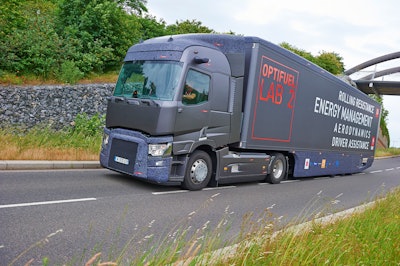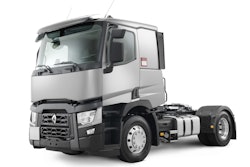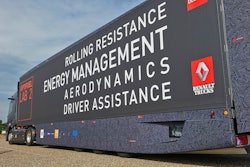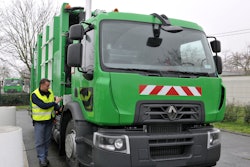
Following several months of road trials and test bench programs adding up to the equivalent of 20,000 km, the verdict has been delivered: the Optifuel Lab 2 laboratory vehicle records consumption 22% lower than that of a production Renault Trucks T. This means 7.2 liters of diesel are saved for every 100 km covered, together with a 194 g reduction of CO2 emissions for every kilometer traveled. Optifuel Lab 2 has been equipped with 20 technologies, each of which meet four major challenges associated with consumption: energy management, aerodynamics, rolling resistance and driving aids.
“We are of course highly satisfied with these results,” explains Claude Covo, project manager for the Optifuel Lab 2. “We are not surprised by them, but they do confirm the already high estimates we had at the beginning of the project under actual operating conditions.” This figure of a 22% savings covers all technologies used, but every one of them has also been measured separately in order to very accurately measure the savings each one contributes. This is why road trials were complemented by a roller test bench program. “Road tests are essential and we have carried out several laps of our test track in the Lyon region,” continues Covo. “But the roller test bench, while faithfully reproducing road conditions, also offers the advantage of not having its results distorted by weather conditions. Furthermore, we can also repeat the test as often as we want. The two testing procedures complement each other and are both essential.”
A laboratory vehicle not destined to be made available as a production model, Optifuel Lab 2 has kept its promises. The project, developed with support from the Agency for the Environment and Energy Control (ADEME) has expanded Renault Trucks’ technical knowledge and also that of its eight partners (Plastic Omnium, Michelin, Sunpower, Renault, IFP Energies Nouvelles, CEP-Armines, the Lyon CETHIL-INSA and the Lyon Central School) with regard to future technologies.
Thanks to this project, engineers can now approve certain technologies while at the same time deciding to reject or further develop others. This knowledge will then allow them to adapt the best performing technologies to production vehicles so that Renault Trucks can offer ever more fuel efficient models. It is worth remembering that when launched on the market in 2013, the Renault Trucks T featured half of the technologies used on the first Optifuel Lab vehicle introduced four years previously.
The road trials were carried out on a 200 km route around Lyon representing an inter-regional transport profile. The Optifuel Lab 2’s average speed was measured at 72.6 km/h with a total load of 33 t, which corresponds to the average load observed in Europe.

















